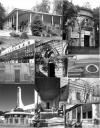Resumo
O trabalho de pesquisa apresentado como abordagem metodológica, articulada a investigação aplicada ea transferência deresultados, em torno do Patrimônio Ambiental (pca) da Área Metropolitana de Mendoza (amm). Nossa hipótese geral argumentaque o património cultural associado ao Território (imobiliário, arquitectura, paisagem urbana, com seus acessórios e meioambiente) é um recurso e uma ferramenta nos processos de desenvolvimento local, que no caso da amm não é levado emconta pelas principais partes interessadas. É por isso que uma avaliação deste conjunto de bens e suas características comorecursos, conforme proposto na pesquisa, permite a ativação e posterior recuperação de ativos e integração na vida do presente.Disse que o projeto realizado em primeiro lugar, para a realização de trabalhos preparatórios específicos de arquiteturae engenharia, como contributo necessário para formar a base para implementar planos de gestão ambiental do PatrimónioCultural amm e, em seguida, em um segundo passo, fazer uma profunda e complexa, específica e relacional deste recurso, fornecendoos interessados com a ferramenta de base científica para a conservação e utilização sustentável dos bens culturais.La revista Apuntes se encuentra registrada bajo la licencia Creative Commons Reconocimiento 4.0 Internacional. Por lo tanto, esta obra se puede reproducir, distribuir y comunicar públicamente en formato digital, siempre que se reconozca el nombre de los autores y a la Pontificia Universidad Javeriana. Se permite citar, adaptar, transformar, autoarchivar, republicar y crear a partir del material, para cualquier finalidad (incluso comercial), siempre que se reconozca adecuadamente la autoría, se proporcione un enlace a la obra original y se indique si se han realizado cambios. La Pontificia Universidad Javeriana no retiene los derechos sobre las obras publicadas y los contenidos son responsabilidad exclusiva de los autores, quienes conservan sus derechos morales, intelectuales, de privacidad y publicidad.
El aval sobre la intervención de la obra (revisión, corrección de estilo, traducción, diagramación) y su posterior divulgación se otorga mediante una licencia de uso y no a través de una cesión de derechos, lo que representa que la revista y la Pontificia Universidad Javeriana se eximen de cualquier responsabilidad que se pueda derivar de una mala práctica ética por parte de los autores. En consecuencia de la protección brindada por la licencia de uso, la revista no se encuentra en la obligación de publicar retractaciones o modificar la información ya publicada, a no ser que la errata surja del proceso de gestión editorial. La publicación de contenidos en esta revista no representa regalías para los contribuyentes.


